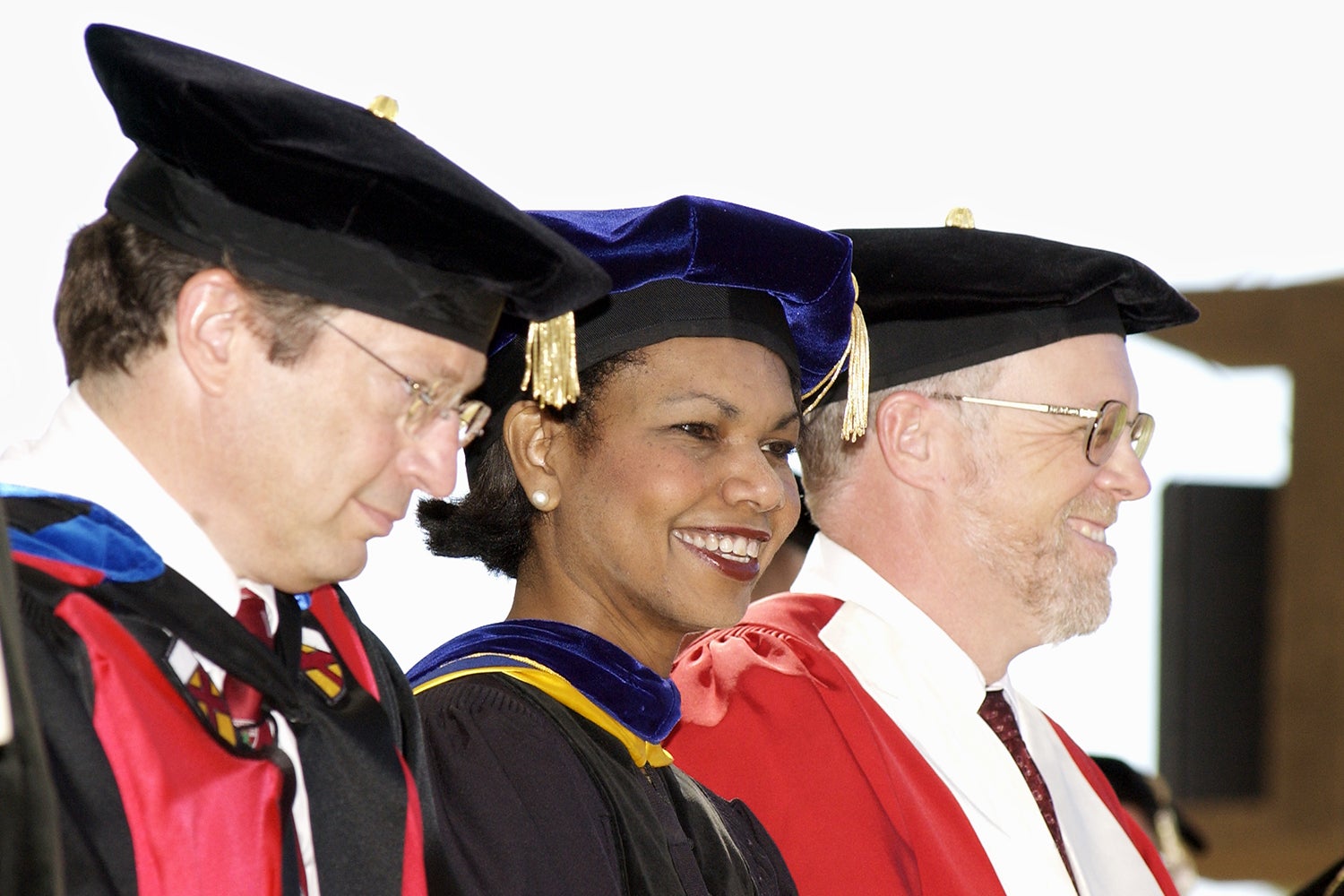Use education to counter hatred, seek freedom, truth, Rice urges grads
“Education is ... the fundamental method of social progress and reform,” U.S. National Security Adviser Condoleezza Rice told thousands of students on Sunday.
U.S. National Security Adviser Condoleezza Rice told thousands of students on Sunday that they must use their education to counter the hatred spread by terrorists around the globe.

Provost John Etchemendy, U.S. National Security Adviser and former Provost Condoleezza Rice and President John Hennessy acknowledged an audience of about 25,000 people gathered Sunday for Stanford’s 111th Commencement. Rice was this year’s Commencement speaker. (Image credit: L.A. Cicero)
“Education is … the fundamental method of social progress and reform,” Rice said, referring to the words of American philosopher John Dewey. In contrast, she said, terrorism seeks to “dehumanize and divide” people and society.
President John Hennessy welcomed an estimated 24,000 people gathered in Stanford Stadium for the university’s 111th Commencement ceremonies. On Sunday, the university awarded 1,736 bachelor’s, 1,985 master’s and 867 doctoral degrees. In addition, 424 seniors graduated with departmental honors and 268 earned university distinction.
In the president’s address, Hennessy discussed the balance between old and new, innovation and tradition. “As you leave this university, I hope you carry a deep appreciation of the values and traditions that are everlasting as well as a willingness to be bold and to approach the challenges before you with a fresh perspective,” he said.
Hennessy paid tribute to John Gardner, a longtime social activist and a Stanford alumnus who died in February. Echoing Rice’s emphasis on the responsibilities that come with earning a Stanford degree, Hennessy said that Gardner defined what it means to be a citizen in a democracy in nine simple words: “Freedom and responsibility, liberty and duty. That’s the deal.”
Rice, a former university provost who is on leave as a political science professor, refrained from making policy statements during her 20-minute speech. However, she made several references to last September’s terrorist attacks and the increased responsibilities that graduating students face in today’s world.
“Today, you are stepping into a world that is quite different than the one that existed when you arrived,” she said. “It is a world that is more sober and sadder — clearer about its vulnerabilities — yet stronger, more conscious of our differences and yet more aware of our common humanity.”
Hennessy introduced Rice as a 20-year member of the Stanford family. Although Rice was on leave during much of the Class of 2002’s time on campus, her remarks have served as bookends to their Stanford experience. As provost, Rice first spoke to the class at Freshman Welcome on Sept. 19, 1998. She recalled encouraging freshmen at the time to find their passion, explore many paths and get to know others — particularly people different from themselves. Four years later, Rice said that she was confident that the class had done this and, as a result, would be better prepared to meet future challenges.
“In the months past, we have been reminded in dramatic and terrifying ways of what happens when difference becomes a license to kill,” she said. Calling the 1963 fatal bombing of the 16th Street Baptist Church in Birmingham, Ala., “home-grown terrorism” of the era, Rice said that its perpetrators tried “to suck hope out of the future by showing that hope could be killed — child by child.” Four young girls died in the bombing, including one of Rice’s neighborhood friends. While Rice didn’t witness the bombing, she heard the explosion a few blocks away.
“The story is repeated — time and again — in the Middle East, in Latin America, in Africa — and it came home to America,” she said. “Innocents are killed to send a message of hatred and to propel old fears into the next generation.”
Rice said that the experiences the Class of 2002 has shared “are a powerful rejoinder to those who would divide us and diminish that which is common in our humanity.”
Whatever challenges the class may face, Rice implored the graduates to be optimistic. “Many people just as talented and just as smart as you did not get to where you are sitting today — often through no fault of their own,” she said. “So never ask why someone else has been given more; ask why you have been given so much.”
As Rice spoke, about two dozen students attached red fliers to their mortarboards protesting the Bush administration’s policies. A large banner reading, “Stop Isolating Us. Respect International Law!” was unfurled in the bleachers.
Outside the stadium, about 40 people from the local community protested U.S. foreign policy by holding signs and banners. Harumi Befu, professor emeritus of anthropology, joined the protest because he said he opposes many policies of the Bush administration. “You cannot end violence with violence,” he said. “The Middle East policy is dismal.”
But the mood of the day was decidedly celebratory. The Wacky Walk — a now traditional 30 minutes of performance art by graduates entering the stadium — preceded the official ceremonies. This year it featured four masked male students who wore nothing more than aprons tied around their midriffs. A group of friends with palm trees attached to their mortarboards ran across the field shouting that they constituted a mobile Palm Drive. And several groups played pinball — using their own bodies — or turned themselves into human dominos.
As Rice left the stage under the watchful eye of Secret Service agents, Shannon Ashford of Columbia, S.C., exclaimed, “Condi, you go, girl!” Ashford, a double major in political science and comparative studies in race and ethnicity, said that she does not agree with all of Rice’s positions but respects her as an African American woman who has gone far. Rice heard Ashford’s remark and, walking through the crowd of students, grinned broadly.
